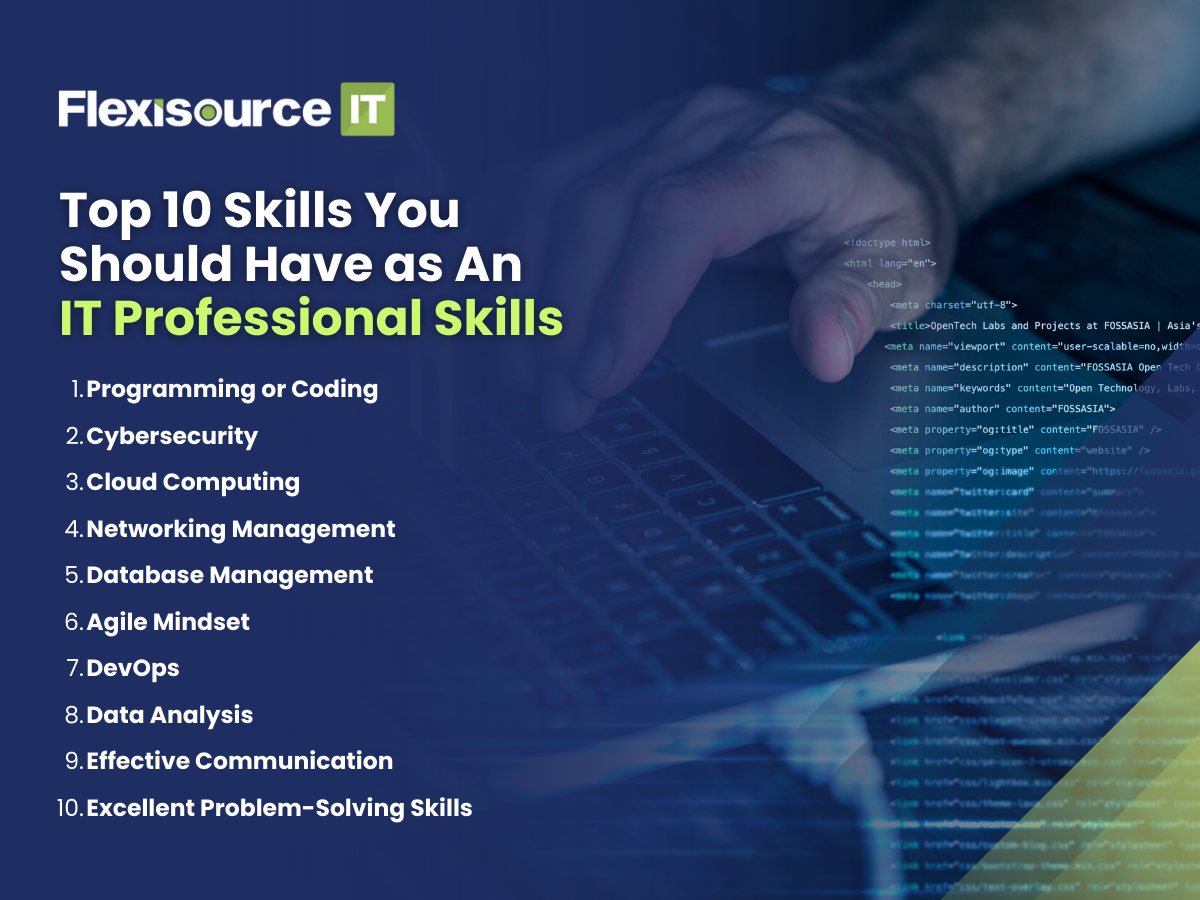In today’s digital age, the information technology (IT) field is evolving unprecedentedly. These rapid technological advancements and the ever-increasing demand for digital solutions have created a highly competitive and dynamic industry.
As an IT professional, you must regularly update and improve your skills to remain competitive and valuable in the job market. This blog will explore the top 10 skills that every IT professional should master in 2024.
Importance of Continuous Learning in The IT Industry
In the IT industry, continuous learning is crucial to achieving success. Given the ever-evolving nature of technology, IT professionals must remain up to date with the latest trends and acquire new skills consistently. By continuously learning and upskilling, IT professionals can gain a competitive edge over others and position themselves as valuable assets in their organisations.
Similarly, continuous learning is essential due to the following reasons:
- Helps IT professionals stay updated on the latest trends and innovations in the industry and learn new skills and tools that are in demand.
- Enables IT professionals to improve their performance, efficiency, and quality of service and increase their value to their organisations.
- Fosters a culture of curiosity, innovation, and problem-solving and enhances the collaboration and communication among IT professionals and stakeholders.
- Develops soft skills, such as adaptability, creativity, and critical thinking, essential for success in the dynamic and complex IT environment.
- Maintain the relevance and employability of IT professionals and prevent them from becoming obsolete in the face of technological advancements.
- Opens new career opportunities and prospects for IT professionals and boosts their confidence and satisfaction.

Top 10 Skills You Should Have as An IT Professional Skills
Now, let’s dive into the top 10 skills that every IT professional should have in their skill set:
1. Programming
First and foremost, programming or coding skills. Programming is one of the most essential IT skills needed when venturing into a career in technology. Why? Coding skills enable you to develop innovative tech solutions, improving efficiency and effectiveness in daily tasks. Likewise, advanced technical capabilities in programming languages allow IT professionals to work on revolutionary ideas and implement cutting-edge solutions.
With that in mind, here are some must-have programming skills:
- Programming languages like PHP, Python, Java, and JavaScript.
- Troubleshooting and debugging skills.
- Familiarity with popular frameworks such as AngularJS and React.
- Keeping abreast of the latest trends and technologies in programming.
Mastering these IT skills enriches an individual’s technical expertise and fosters a competitive advantage in the job market. This paved the way for continual career growth in information technology.
2. Cybersecurity
In an increasingly digital world, protecting digital assets and information technology systems against potential threats has become a critical concern. With that said, having basic cybersecurity skills is essential.
Cybersecurity skills are crucial for IT professionals, as they help them ensure the confidentiality, integrity, and availability of IT resources and services and prevent and respond to cyberattacks and incidents. You can develop your cybersecurity experience by learning the following IT skills:
- In-depth knowledge of cybersecurity measures and best practices
- Familiarity with cybersecurity tools, trends, and techniques
- Advanced expertise in cybersecurity to ensure a secure digital environment and safeguard against potential threats.
- Familiarity with network security, encryption protocols, and threat intelligence is necessary to combat evolving cybersecurity challenges effectively.
3. Cloud Computing
In today’s digital age, cloud computing is a crucial driver of digital transformation and a vital component of the modern IT landscape. According to a report by Gartner, worldwide end-user spending on public cloud services is forecast to grow 23.1% in 2021 to a total of $332.3 billion, up from $270 billion in 2020.
Why? Well, cloud computing offers many advantages for businesses and individuals. Firstly, it has revolutionised our lives by allowing users to access their data and applications from anywhere and anytime, as long as they have an internet connection. More than that, it provides scalability and flexibility, as users can adjust their IT resources according to their needs and demands without wasting or overpaying for them.
With that said, cloud computing is a vital IT skill. To achieve advanced proficiency in cloud computing, one must have the following IT skills:
- Familiarity with platforms like Google Cloud that facilitate the scalability of digital resources.
- Technical skills like cloud computing, such as data storage and management, and optimising digital transformation
- Advanced skills in cloud computing expertise, including cloud architecture, deployment, and management.
- Familiarity with public, private, and hybrid cloud models is valuable.
- Knowledge of IT security and data protection regulations is essential for IT professionals in today’s tech landscape.
4. Networking
Networking is the process of connecting and communicating between computers, devices, and systems using various hardware and software components, such as routers, switches, cables, protocols, and standards. With that said, networking is crucial within the IT system as it ensures seamless data transfer and connectivity to keep the infrastructure running smoothly.
Likewise, networking skills are essential for IT professionals. They enable them to design, configure, maintain, and troubleshoot network infrastructures and services and ensure network resources, data performance, security, and availability.
Here are some skills needed in network management:
- Familiarity with network architecture, topology, addressing, routing, switching, wireless, security, and troubleshooting.
- Certifications including Cisco Certified Network Associate, Cisco Certified Network Professional, and CompTIA Network+.
- Emerging technologies including cloud computing, the Internet of Things (IoT), and artificial intelligence (AI).
5. Database Management
Data is everywhere in today’s digital age. Anything we do creates data, from social media to clicking links on web pages. For all that, database management is essential.
Database management provides a structured and organised way to store data. It ensures that data is accurate, accessible, and secure, contributing significantly to the success of IT systems and organisations. With that data, IT professionals can handle large datasets and support data-driven decision-making.
To have a career in data management, you should have the following:
- Proficiency in database architecture, design, and optimisation.
- Ability to analyse data sets to extract meaningful insights such as statistical analysis, data modelling, and interpreting results.
- Knowledge of database systems such as SQL and NoSQL.
- Experience in designing, implementing, and maintaining databases.
- Understanding of cloud database platforms like AWS, Google Cloud, and Azure.
- Ability to integrate data from various sources, such as databases, APIs, and external systems.
- Proficiency in data visualisation tools like Tableau and Power BI
6. Agile Methodologies
Agile methodologies are widely used in IT to manage and execute projects more efficiently and collaboratively. It facilitates continuous improvement, allowing professionals to stay ahead of industry trends and technological advancements. Likewise, agile methodology encourages teamwork and communication between different departments, ensuring everyone is on the same page regarding project goals.
Here are some critical IT skills related to Agile methodologies:
- Ability to adapt to changing project requirements and efficiently deliver high-quality products.
- A deep understanding of advanced concepts like Scrum or Kanban
- Proficiency in creating user stories, a short, simple description of a feature told from the end user’s perspective.
- Capability in using Agile project management tools to plan, track, and manage work items.
7. DevOps
DevOps expertise is becoming increasingly critical in optimising software development and deployment. Professionals with advanced skills in DevOps can help bridge the gap between development and operations, implementing innovative ideas in software delivery. Ultimately, proficiency in DevOps can lead to faster time-to-market for software products, improved quality control, and increased customer satisfaction.
As such, here are some IT skills you need to have to be proficient in DevOps, you must:
- Know how to use Linux commands, tools, and scripts to perform various tasks, such as file handling, system administration, text processing, and process management.
- Can create, modify, and execute software applications using various programming languages, tools, and frameworks.
- Familiarity on how to use automation tools like Source Code Management (SCM), Ansible, Jenkins, and Chef.
- Able to perform various types of testing, such as unit testing, integration testing, system testing, and user acceptance testing, and how to use testing tools like Selenium, JUnit, and Cucumber.
8. Data Analysis
Data analysis is the process of collecting, processing, and interpreting data to generate insights and solutions for various IT and business problems and needs. It is an essential aspect of IT as it helps professionals leverage the power and potential of data and optimise data-based solutions for various IT needs and goals.
Having said that, a firm grasp of data analysis tools and techniques is critical for IT professionals. As such, here are some of the data analysis skills that IT professionals should have:
- Knowledge of how to gather, organise, and present data to identify trends and patterns.
- Statistical programming languages like Python, R, SQL, and SAS to perform various data analysis tasks.
- Create reports and presentations that help decision-makers make smarter business decisions based on data using tools.
- Knowledge of predictive data models and techniques like machine learning, artificial intelligence, and big data.
9. Communication
Effective communication is the ability to convey information and ideas accurately and persuasively to others. It involves verbal and non-verbal skills, such as speaking, writing, listening, and body language.
Similarly, effective communication is essential for IT professionals because it helps them to collaborate and coordinate with different teams and stakeholders, such as developers, operations, testers, customers, and managers. With that said, some of the communication skills that IT professionals should have are:
- Ability to use simple and precise language, avoiding jargon and ambiguity.
- Show empathy and rapport for team members and clients to understand their perspectives and feelings.
- Adjust communication styles and approaches, according to context and audiences.
10. Problem-Solving
Problem-solving is the ability to identify, analyse, and resolve problems that arise in various IT situations. IT professionals should have problem-solving skills because they help them find effective and efficient solutions for technical issues and challenges when they arise.
With that said, IT professionals should have various problem-solving skills to excel in their roles. Some essential IT skills include:
- Ability to analyse information systematically, identify patterns, and recognise underlying causes of problems is crucial for IT professionals.
- Creativity and capacity to think outside the box, explore alternative approaches, and innovate to solve complex challenges.
- Attention to detail to accurately diagnose and address technical issues.
- Deep understanding of various technologies, systems, and platforms relevant to their roles.
- Aptness to quickly learn and apply new skills, stay updated with industry trends, and effectively address emerging challenges.
- Strong time management skills to help them prioritise tasks, allocate resources effectively, and meet project deadlines while maintaining quality and efficiency in problem-solving efforts.
Conclusion
In conclusion, IT professionals must regularly develop and enhance their skills to stay relevant and valuable in the fast-changing and competitive IT industry. The above-mentioned IT skills will help professionals to deliver faster and better IT solutions and services. With time and effort, IT professionals can boost their performance, efficiency, and satisfaction, opening up new career opportunities and prospects.
If you are looking for a rewarding and challenging IT career, look no further! Flexisource IT can help you grow and excel in your IT field. We provide our employees with a supportive and collaborative work environment, competitive compensation, and continuous learning opportunities.
Don’t wait any longer. Start your IT career with Flexisource IT today and join a team of talented and passionate IT professionals. Visit our career page now!





